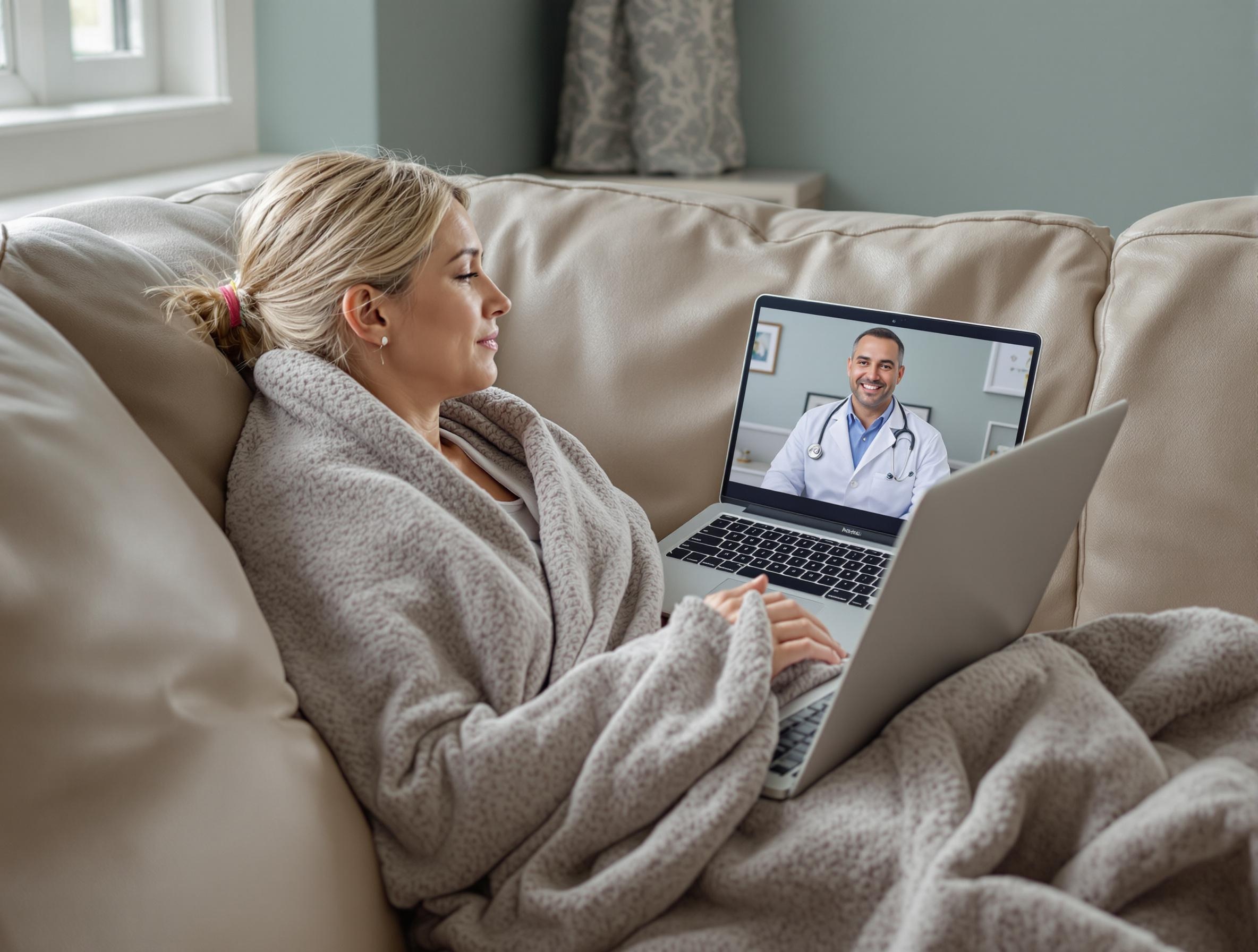10 States Making Telehealth Across State Lines Seamless

Key Takeaways:
- Telehealth across state lines increases access to specialized healthcare, breaking down geographical barriers and providing quality care to underserved areas.
- Several states, including California and Florida, have implemented progressive laws and policies to make interstate telehealth more accessible and convenient for both patients and providers.
- Mobile Care Health is dedicated to offering innovative and personalized telehealth solutions, ensuring patients can benefit from these advancements in remote healthcare.
During the height of the COVID-19 pandemic, over a third of all doctors’ appointments in the United States were conducted via telehealth. This dramatic shift spotlighted the potential of remote healthcare delivery, especially when providing services beyond traditional geographical boundaries.
Telehealth that transcends state borders allows patients to access specialized care regardless of their location, dismantling obstacles to quality healthcare. For providers, it unlocks new opportunities to expand their practice and reach patients who may not have access to certain specialties in their area.
At Mobile Care Health, we’re committed to providing innovative, personalized healthcare solutions that align with these advancements in telehealth. Curious about how you can benefit from cutting-edge telehealth services? Visit Mobile Care Health to explore our tailored healthcare options designed with your unique needs.
Understanding telehealth across state lines
Telehealth across state lines allows healthcare providers to offer remote services to patients in different states, expanding access to specialized care beyond geographical boundaries. This approach has gained significant traction, with approximately 10 million patients in the United States receiving telemedicine services annually. While telehealth offers numerous benefits, it also faces regulatory considerations. State licensing requirements have been a primary challenge, with many flexibilities allowing cross-state practice to be temporary in recent years. However, states are actively working to address these complexities.
California
California has consistently blazed trails in telehealth legislation, inspiring other states to follow suit. The Telemedicine Development Act of 1996 paved the way for delivering healthcare services through telemedicine, recognizing telehealth as a valuable mode of care using information and communication technologies.
This pioneering strategy has blossomed into a comprehensive approach that puts patients first. For example, California law ensures that health plans can’t insist on in-person visits before covering telehealth services, making remote care as accessible as traditional office visits.
One of California’s game-changing telehealth policies allows out-of-state practitioners to consult within the state without being subject to the Medical Practice Act. This allows Californians to connect with a wider range of specialists, bringing expert care to their homes. It’s especially heartening for those in rural or underserved areas who might otherwise struggle to find the right care.
Florida
Florida has taken significant strides in embracing telehealth, making accessing care across state lines easier. The Sunshine State allows out-of-state healthcare professionals to provide telehealth services to Florida residents through a streamlined registration process with the Florida Department of Health. This patient-focused approach breaks down geographical barriers, connecting you with a broader range of healthcare experts who can address your unique needs.
The state’s comprehensive telehealth definition covers services like assessment, diagnosis, consultation, and treatment. This inclusive approach means you can receive personalized care for various health concerns, all from the comfort of your home. Imagine having access to specialists who truly understand your condition, regardless of where they’re located.
New York
New York has embraced a forward-thinking approach to telehealth, crafting regulations that put patients first while maintaining high standards of care. In 2022, the New York State Office of Mental Health updated its regulations to expand telehealth services, allowing for audio-only options and strengthening consent language.
This progressive stance opens up more avenues for you to receive care, especially if you face technological barriers. We understand that your health journey is unique, and these expanded options mean you’re more likely to find care that fits your specific needs.
For providers, New York sets clear guidelines. Telehealth practitioners must possess a current, valid license, adhere to state laws, maintain care standards, and ensure patient privacy. These thoughtful regulations and New York’s commitment to reimbursement parity for telehealth services create a supportive environment for cross-state healthcare delivery.
Washington
Washington State has made significant strides in broadening its telehealth landscape, recognizing the vital role of remote healthcare in improving access and outcomes for its residents. In 2017, the state updated its parity law to enhance reimbursement policies for telemedicine services, setting the stage for a more robust telehealth ecosystem.
This expansion has made it easier for you to access mental health support when needed most and manage chronic conditions from the comfort of your home. Imagine being able to consult with a psychiatrist or receive guidance on managing diabetes without leaving your living room.
Washington’s forward-thinking approach extends beyond its borders with services designed to welcome out-of-state patients.
Massachusetts
Massachusetts has set a high standard with its comprehensive telehealth guidelines, ensuring that remote healthcare services are safe, private, and of the highest quality. The state defines telehealth as the use of audio, video, or other telecommunication technology for evaluating, diagnosing, consulting, treating, or monitoring patients’ health conditions. This inclusive definition allows a wide range of services to be provided remotely, making healthcare more accessible if you struggle with in-person visits.
A key element of Massachusetts’ telehealth landscape is its commitment to fair reimbursement. Behavioral health services are permanently reimbursed at the same rate as in-person visits, recognizing the critical importance of mental health support.
Primary care and chronic disease management services also receive equal reimbursement for a set period, encouraging healthcare providers to embrace telehealth options. These guidelines make it easier for professionals to operate across state lines and ensure that you receive the care you need when you need it.
At Mobile Care Health, we’re excited about how these patient-centered policies align with our mission to provide personalized, accessible healthcare solutions that cater to your unique health journey.
Arizona
Arizona has embraced telehealth with open arms, focusing on bringing quality healthcare right to your doorstep, no matter where you live in the Grand Canyon State. The Arizona Health Care Cost Containment System (AHCCCS) covers a wide range of telehealth services, including live video consultations and technologies allowing you to share health information with your doctor for later review securely.
This comprehensive approach ensures that whether you’re managing a chronic condition or seeking specialist advice, you can do so from the comfort of your home. Recognizing the unique needs of each community, Arizona formed a Telehealth Advisory Committee in July 2021 to fine-tune telehealth practices. This effort is particularly heartening for rural residents who’ve often faced long journeys for medical care.
Illinois
Illinois has made significant progress in bringing healthcare right to your doorstep through telehealth expansion. In a game-changing move, Governor JB Pritzker signed legislation (HB 3308) into law, securing Illinois’ position at the forefront of telehealth innovation. This forward-thinking approach ensures equal access to mental health and substance use disorder services, in-person or online, while covering all other telehealth services through 2027.
You might be surprised to learn that 75 out of 102 Illinois counties are considered dental Health Professional Shortage Areas. That’s why Illinois’ decision to include dental care and physical therapy in telehealth services is so important – it means you can access specialized care more easily, no matter where you call home in the Prairie State.
At Mobile Care Health, we’re thrilled about how Illinois’ telehealth expansion aligns with our commitment to your personalized care. So whether you’re managing a chronic condition or seeking expert advice, know that innovative, easily accessible solutions are now at your fingertips, supporting your unique health journey at every step.
Virginia
Virginia is bridging the gap in healthcare access through innovative interstate collaborations. The state has forged partnerships with Maryland and Washington D.C., paving the way for seamless healthcare delivery across these borders. Imagine being able to consult with a specialist in D.C. or receive follow-up care from a Maryland doctor, all while staying in the comfort of your Virginia home.
These partnerships are part of a broader initiative, with Virginia joining 28 other states in creating flexible licensing options for out-of-state telehealth providers. By participating in these interstate healthcare collaborations, Virginia opens doors to specialized care you might not find locally.
Colorado
Colorado stands out as a pioneer in telehealth, offering flexible regulations that foster innovation and accessibility across state lines. The state allows healthcare professionals authorized to practice in Colorado to provide care via telehealth to individuals in other states, breaking down geographical barriers to quality healthcare.
This approach, centered on your needs, extends to out-of-state providers, who can offer services to Colorado residents by simply registering with the appropriate regulator. Imagine having access to specialized care from the comfort of your home, regardless of where your healthcare professional is located.
Colorado’s policies have created a welcoming environment for innovative healthcare delivery models. For instance, the state has adopted agreements like the Psychology Interjurisdictional Compact and Interstate Medical Licensure Compact, which ensure the reciprocity of state licenses for telehealth services.
Embracing seamless telehealth
From California’s progressive laws to Colorado’s flexible regulations, states nationwide are creating a borderless healthcare landscape. These innovative policies are transforming how we access care, putting specialized services at our fingertips, no matter where we call home. Imagine consulting with a top specialist or receiving ongoing care for a chronic condition, all from the comfort of your living room.
While telehealth currently represents less than 1% of all outpatient visits for Medicare fee-for-service beneficiaries, its potential to enhance your healthcare experience is boundless.
At Mobile Care Health, we’re thrilled about these advancements and how they can positively impact your health journey. Ready to experience healthcare that’s as unique as you are? Discover our tailored telehealth solutions at Mobile Care Health and take the first step towards more accessible, personalized care.
Articles on this site are for general education and do not substitute for professional medical advice. Consult our providers for personalized recommendations.





